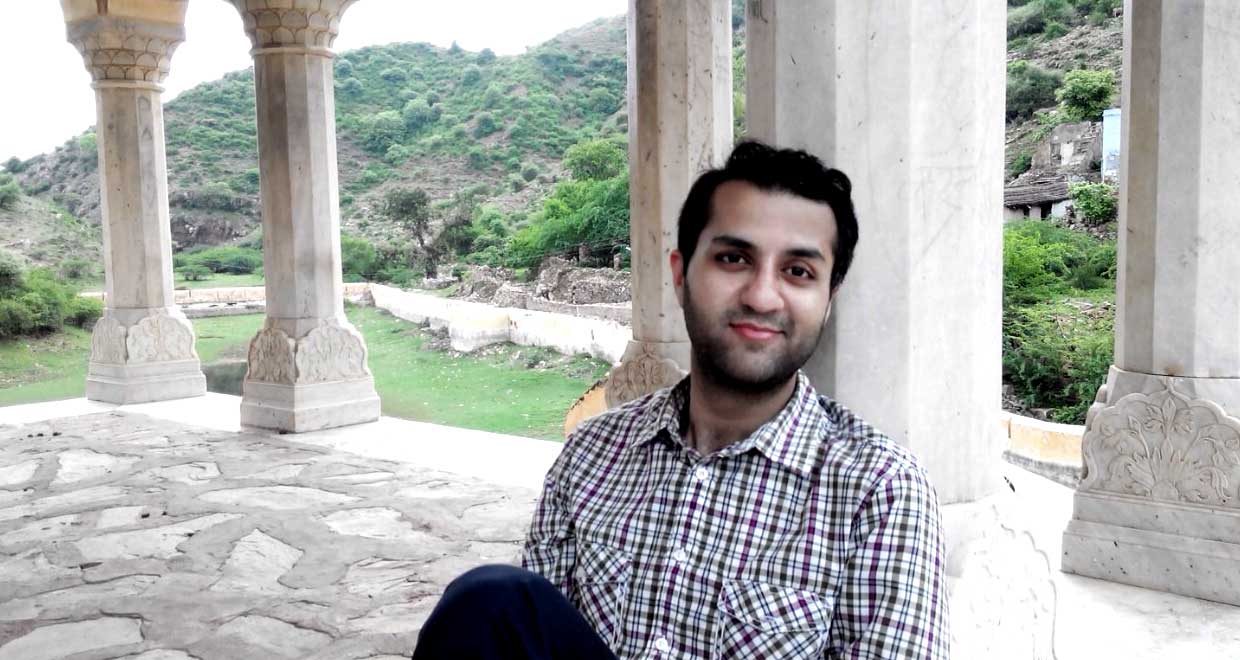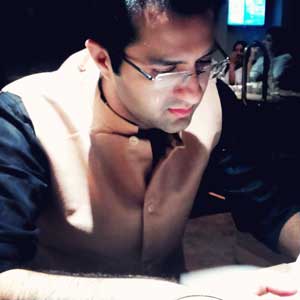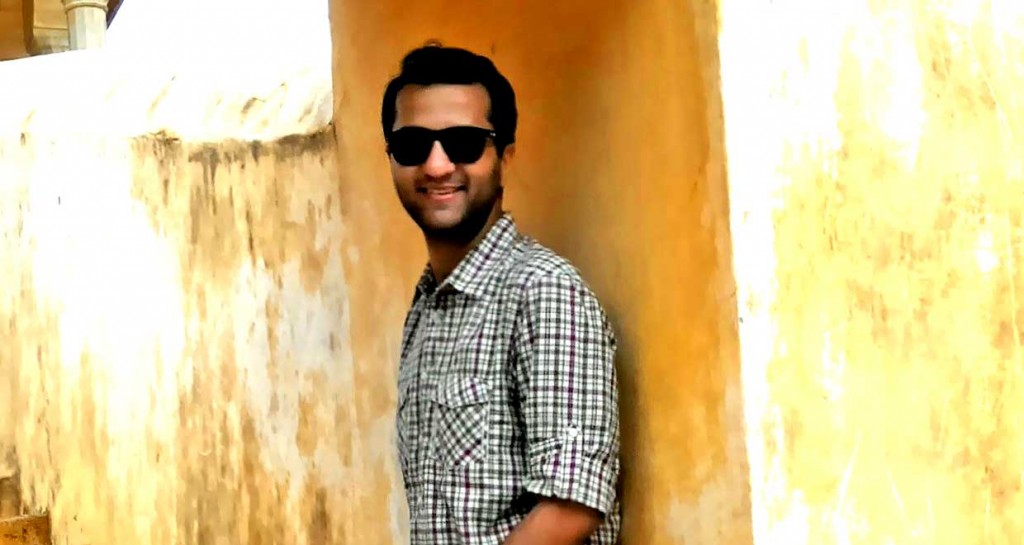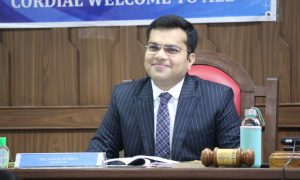Adhirath Singh Palawat specializes in Mergers and Acquisitions at Allen & Overy. He graduated from National Law University Jodhpur with Honours in Business Law as well as the Mathur Amar Laxmi and Gopal Mal Mehta Memorial Gold Medals for his academic performance. He was also felicitated by the Ministry of Human Resources Development, Government of India for Excellence in Academics.
He successfully applied to the Vacation Placement programme at both Allen & Overy and Herbert Smith Freehills. While working as a Legal Advisor at Allen & Overy, London, he underwent a six month secondment to Dubai, where he still works. In this interview he talks about:
- Balancing academics and extra-curricular activities in law school
- Building a career in corporate law
- Vacation Placement, Training Contract and Secondment at Allen & Overy
How would you introduce yourself? Could you please share a little bit of what motivated you to pursue law as a career?
I never know how to answer this one! I’ll play it safe – I am originally from Jaipur; I did my LL.B from NLU, Jodhpur with Honours in Business Law; I presently work with Allen & Overy LLP.
I was always fascinated by law as a subject because both my parents hold law degrees (though neither of them pursued a career in law), but I decided quite late to explore this academic interest as a career option. If I had to pin it down to something, I would say my interest in law arose because I have always perceived it to be an instrument of social change. Unlike the natural sciences, law is a subject by the people for the people and this aspect of ‘social contract’ always fascinated me. The other reason is that law is a subject that emphasises a lot on soft skills. To be a good lawyer, you need to possess much more than pure technical skills; this is something that resonated a lot with my views on education and what I wanted for myself professionally.
Tell us a little about your law school days at National Law University, Jodhpur? How would you compare NLUJ with other law schools?
I don’t think I am in a position to objectively compare NLUJ with any other university, but in absolute terms, I look back on my five years at university as the best years of my life (so far). Like any other opportunity in life, university experience is only as good or bad as you make it to be. Are there universities with a better brand name than NLUJ out there? Of course. Does that really make a difference in your quality of education/life and options in the long run? I don’t think so.
Learning from your peers is an underrated concept in our education system. I personally was thankful for the opportunity to meet so many brilliant people, each impressive in his or her own unique way, be it in academics, mooting, debating or creative pursuits. I think I learnt much more outside the classroom than inside. There are always things one could do differently but, all in all, I had a fulfilling experience.
Upon graduation you received the Mathur Amar Laxmi Gold Medal and the Gopal Mal Mehta Memorial Gold Medal for your CGPA. Please tell us about the manner in which you approached academics while in college.
I believe one’s academic experience is largely dependent on personal targets and what one wants out of the university experience. Although I was always keen to learn more and gain as much knowledge as possible, I was never in constant pursuit of knowledge; in my view that is insatiable. Time is a precious commodity and everything comes at a cost. I made a very conscious decision to prioritise and divide my time among the various activities I was involved in. I approached knowledge as a means to an end and not an end in itself.
The truth is that any profession, law included, is result oriented. There are different ways of achieving it as long as you are focussed on the result. I was quite particular about ensuring that my concepts were as clear as possible – to me that matters the most. Academics were very important and I ensured that I was always well-prepared before the exams. But beyond that, I was never one to reserve time every day for studying; I felt there were lots of other things that required my attention and time on a daily basis.
In my opinion, the trick is in finding a balance, between academics and extra-curriculars, between dedication and efficiency. It is a very personal decision. For me, it was much more important to grow holistically and become a better-rounded person than focus solely on academics and I have never regretted that.
You were recognised by the Ministry of Human Resources Development, Government of India for Excellence in Academics. Please tell us about this felicitation.
I received a letter from the Government of India informing me that I had been selected for the recognition and that I was invited to attend the Republic Day parade in New Delhi from the Prime Minister’s box as a guest of the Prime Minister. They had selected students from across the country. I understand this was based on my academic performance at school and during the first year of university. I was really grateful for the recognition.
You were also a member of the Editorial Committee. How significant do you think that the experience was?
I had been an editor of my school’s magazine and wanted to continue such involvement during university. I was a member of the Editorial Committee during the first year. The experience was quite enriching for various reasons, not least of which was the opportunity to learn how to work with different people. First year is a time when everyone is still in the process of discovering themselves, their interests, their ambitions and what activities they would like to pursue in the future. I eventually realized that I was more passionate about and could make a greater difference as a member of the Academic Support and Literary Committee, which I was involved with for the four years that followed.
You’ve held multiple positions of responsibility throughout your college life. We would like to know your opinion on how significant they were. Please tell us about your experience and how you managed time effectively?
For me, the significance of these responsibilities cannot be overstated. To a large extent, my extra-curricular pursuits defined my university experience. I genuinely enjoyed getting involved with as many things as possible. Leadership opportunities are an excellent way for one to not just improve the lives of others around them but also, more importantly, oneself as a community member.
I had exposure to a variety of leadership roles, most notable ones being the Student Chief Counsel (President of the student body), Convenor of the Academic Support and Literary Committee and the Co-President of the University’s first literary-cultural festival. These experiences taught me invaluable lessons in handling various situations and people, something I would have never otherwise learnt to quite the same extent.
Time management is always an issue but then again university life is all about time management. I believe if you are passionate about something, you make the time for it. It is important to be realistic though; you can only do so much. These activities taught me the skill of time management, something that (as we all know) comes in handy when one starts working.
How important do you think extra-curricular activities are to a law student? Please tell us about the way you approached extra-curricular activities in college.
It is very important for one to pursue his/her interests throughout university life and, as much as possible, afterwards. It is our extra-curricular endeavours which add personality to our mundane profiles. Even on a practical level, who would you rather work with – Candidate A, who has a GPA of 9.5/10, has written several papers on constitutional law and did an internship with the largest firm in India; or Candidate B, who has a GPA of 8.5/10 but was a member of the environmental club, played the guitar, participated in moot courts and represented his university at a theatre festival? I appreciate that there may be people who pick Candidate A, but I personally would rather work with Candidate B.
I always advise against the exercise of ‘CV Building’ and advocate ‘Personality Building’. It is much more important to do what you want than what you think others would like to see in your CV. Don’t aim to be the person whom all seniors at big law firms would want to hire, be the person with whom all juniors at a firm (big or small) would want to work.
I did what interested me but never for my CV. Not focussing on the things that were not right for me gave me the time to focus on the right ones. There were times when balancing was tough but because I was truly passionate about what I was doing, it was easy to pull through.
How relevant do you think internships are for law students? Did you have any such experience during your internships which inspired you to pursue a career in corporate law?
Internships are quite important to get a sense of what work is like and discover one’s interests. Internships also serve the function of putting you on the firm’s radar. Sensibly planned internships can no doubt help in recruitment. I would, however, advise against relying solely or too much on an internship to determine a firm’s environment or the kind of work you would be doing.
I started interning with law firms mostly after I had decided to pursue Business Law as my Honours. I wanted to see the kind of work and options available. My internship experiences validated my choice (of Business Law) to some extent and gave me an opportunity to understand what I was getting myself into.
There is an increasing practice nowadays of doing premature internships or too many internships. I can’t say whether it is right or wrong, but I feel that students need to take a step back and evaluate what they want. Interning with a corporate law firm in your first or second year may not be as beneficial as you want it to be and you lose out on an opportunity to explore different career options.
You’ve interned in quite a few top-tier law firms. How did you plan your internships?
My intention was to experience as many different setups as possible to help me decide what I ultimately wanted to do. I adopted a tiered approach. I started with firms where the teams were smaller and the work was more generic. With time, I started applying for the larger firms where I was exposed to niche areas and ‘top-tier’ work environments. This gradual increase in the scale of firms helped me get a clearer picture across the spectrum by the time I graduated.
We would love to hear about your work profile. Please tell us about the responsibilities you are entrusted with. What made you choose this particular avenue?
During my Training Contract with Allen & Overy, I did six-month seats in international capital markets, banking and finance, and corporate. I found corporate work to be the most interesting and diverse and decided to qualify (a term used in UK firms for when you join a department permanently after your TC) to the corporate team in Dubai.
I specialise in Mergers and Acquisitions. I do a lot of private M&A, some public M&A (equity capital markets), venture capital and private equity work; these are all related. The good thing about corporate is that no two deals are identical and the work can be quite varied, that keeps the monotony at bay! On a typical deal, I find myself negotiating and drafting transaction documents (like share purchase agreements and shareholders’ agreements) and handling transaction logistics. A not-so-fun task, though a very important one, for a junior is conducting (the much dreaded) due diligence.
How did you develop your interest and knowledge base in corporate law?
I have answered about my interest above. As for knowledge, even though India and UK have largely similar legal systems, there were a few English-law specific points of corporate law that I picked-up as I went along. For any transactional lawyer, the main learning starts only once you start working. It is not possible for anyone to read through and retain the entire Companies Law. But it’s surprising how much you pick-up in small batches by working on deals and transaction documents.
What is an average working day like for you? Please tell us about the same.
As everyone knows, in a law firm, the actual working hours are quite different from the official hours. What I do depends on the deal flow at the time. I wouldn’t want to bore people with details of corporate work but in short, there are good days and not so good days (let’s avoid the negativity of ‘bad’). I would say a good day is when you do more drafting and less administrative tasks (and no DD!). An OK day is a mixture of drafting and administrative tasks like managing signing or completion processes. A not so good day is when you are ploughing through reams of DD documents or are being pulled in several directions at the same time. The last set is not a daily affair but one needs to be prepared for it.
What were the biggest hurdles and challenges in the early days of your career? How did you deal with them?
The biggest hurdle I faced was the sudden realisation that working in a law firm required me to know and do things which a law degree may not have necessarily prepared me for. The academic study of law can be quite far removed from its practice, especially if you are working as a transactional lawyer. Your job requires you to have as much commercial aptitude, if not more, as legal knowledge. It took me a while to become reasonably confident about my work and grasp how a deal runs; it is a constant learning process.
On a less obvious note, I started my career in London so another hurdle was minor cultural practices which percolate into our professional mannerisms. In my experience, we tend to swing in extremes; we are either quite formal (and deferential) or can come across as being slightly overconfident. I noticed I used to err on the side of the former. Finding the right balance is important.
Tell us a little about your experience as a Vacation Placement Student at Allen & Overy and Herbert Smith Freehills. How did you secure this opportunity?
International firms have very formal and transparent application procedures. You do not need to grapple around for internship opportunities. I applied to both HSF and A&O through their online annual vacation scheme applications and was fortunate enough to make it. There was an initial screening followed by interviews and case studies for both these firms. For people interested in foreign firms, I would strongly recommend keeping a timetable of when the applications are due – ideally in your third year so that you can apply in your fourth.
Both the experiences were fantastic. I was instantly sold on the work environment and culture at both the firms. The experiences were similar in many ways but different in others. The similarity was evident in terms of warm personalities, professional environments and a clear respect for work-life balance. The differences were more subtle due to the difference in the scale of the two firms (magic-circle versus silver-circle). I was also quite impressed to see the emphasis placed on soft skills and giving the right training. I decided that I wanted such training for the formative stages of my career.
While working as Legal Advisor at Allen & Overy, you underwent a six month secondment to Dubai. A lot of our readers would like to know how the process of secondment works. Please share a few words about your experience.
A ‘secondment’ is like a temporary six-month stint you do in another office or with a client. It is common practice at UK firms to apply for a secondment in your last seat. I was extremely keen to try out Dubai as a market.
The experience was wonderful (as you can probably deduce from the fact that I am still here). The office is much smaller so everyone knew everyone, the corporate team was much more closely-knit, there was more scope for direct responsibility at a junior level and, above all, it was not raining/freezing/gloomy 365 days a year. What also helped was the fact that A&O has one of the best M&A practices in the region so the work was diverse and (more often than not) interesting.
What do you think are the essential soft skills that a law student aspiring to make a career in corporate law should possess?
Corporate law or otherwise, what comes in handy the most is a confident demeanour. How you present yourself has a significant impact on how people perceive you and your work. This extends to the way you talk (presenting your thoughts in an articulate and coherent manner), the way you deal with people and the way you handle stressful situations. In my experience, people would rather give work to someone who, even if not outstanding, is confident and can stay calm when faced with the unforeseen than someone who is brilliant but may drop the ball or lose his/her composure. If I may add, people often mistake confidence for the ability to convince everyone even when you are unsure of yourself. That’s great but it will only take you so far. What is more important is having the confidence to own up to your limitations; this inspires others’ trust in you and ensures success in the longer run.
In terms of career-specific soft skills, transactional lawyers should always strive to develop matter-management skills. Deals can get stressful and at such times, people who manage to stay organised do better. So if anyone makes fun of you for being too organised (like colour-coding your notes, etc.), don’t worry, you will do well in corporate law!
What does the process of recruitment and interviewing include? Does it differ, depending on the position that the candidate has applied for, or the country which the office is situated in?
I was selected through the vacation placement route. After an initial screening of applicants, they called a few of us for interview. The interview (in my time) was split into two components, an HR interview and a case study. During the vacation scheme, I went through a similar process in London where I was assessed on my time there and was also asked to undertake a case study/research task and had a final partner interview.
While I am not in a position to comment on the official policy, I think the process may differ slightly depending on which office you are applying to and the position applied for. The above definitely won’t apply for lateral hires. While all offices have a fairly formal process, the head office (London) has a slightly different format because of the requirement of a Training Contract in the UK.
Once hired, is there an induction or training period for the associates? If yes, what does it consist of?
If hired in London after graduation, you have to complete a Training Contract for two years. The two year tenure is divided into four six-month seats wherein you get a chance to experience different departments and decide where you want to ‘qualify’. Towards the end of the Training Contract, depending on your interest area and that department’s inclination, you may be offered a position as an associate. Once you become an associate, there is no training or induction involved.
Overseas qualified lawyers (such as from India) have to clear an exam called the Qualified Lawyers Transfer Scheme in order to be registered as a Solicitor in England and Wales.
What does an average day in the life of an Associate at Allen & Overy look like? What does the work consist of? Does the firm encourage lawyers to maintain a work-life balance?
I have already described a typical day for a corporate associate above. In terms of work-life balance, that is a tough question. Being very honest, you will find mixed opinions on this topic. In my experience, the firm is definitely quite open to and encourages employees to maintain a work-life balance, but it also depends on your team and department. There are of course busy times when everyone has to put in the hours (especially in a magic-circle firm). I will, however, say that most departments don’t have the culture of face time.
As a concluding message, what would be your suggestions to law students?
Make the most of university days; that is a precious period you will not get back. At the cost of repeating myself, I would advise against doing anything for the sake of building your CV. If you truly want to differentiate yourself from others, do what inspires and interests you, be it writing papers or dancing. Try to become a better version of yourself, and in the process I am sure you will end up becoming a better lawyer. It is easy to let your vision get jaded while at university; in the long run, things that you thought really matter actually may not.
Lastly, don’t shy away from letting your hair down. You have a lifetime of hard work ahead of you anyway. And “always remember where you come from and where you want to go”..


























